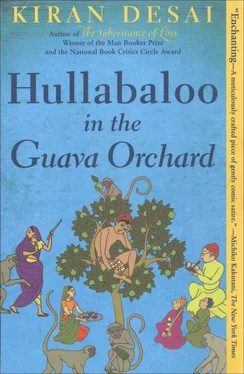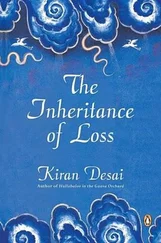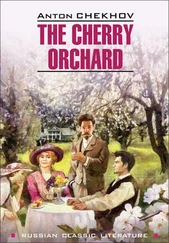‘No one will be asking them, madamji. They will be kicking them out without asking them anything at all,’ said one vulgar man.
But scores of people rushed to Miss Jyotsna’s rescue. ‘How can you say that? You have no shame.’
‘Oh, rubbish,’ said the spy, who was in an awful mood these days. ‘Of course the monkeys should be done away with. They are cluttering up everything.’
People could not believe their ears. ‘Did you hear what he said?’ they asked each other. ‘Rubbish, done away with, cluttering up …’
Miss Jyotsna turned around ferociously to face him. The two-faced hypocrite! Here he had been coming to the orchard every day, professing his affection for Monkey Baba, noting down everything he said, and now he was advocating something that could only bring Monkey Baba pain. In fact, if the monkeys were removed they would not even be able to call the Monkey Baba Monkey Baba any more, for there would be no more monkeys.
‘Traitor,’ she said, and, to everyone’s surprise, especially Sampath’s, pursing her small round mouth, gentle Miss Jyotsna swung at the spy with her handbag and hit him in the stomach so he was forced to leave immediately and catch a rickshaw home.
‘Oh,’ said Pinky and Ammaji admiringly. Perhaps this girl had something to her after all. This was quite a change from all that sentimental singing beneath the tree. But they were forced to side with Mr Chawla, who, to Miss Jyotsna’s distress, said much the same thing as the spy, reasoning that the Baba might end up hurt and with rabies. At this, Miss Jyotsna did not know what to say and dissolved into tears. There seemed to be no solution to the problem.
Sampath was left worn out by these discussions, as if he himself had been caught hold of and pulled in various directions; as if he’d been stamped on and beaten black and blue. Yet, even though he was fatigued, every so often he was swept away on such a surge of anger, it was all he could do to keep from leaping up and throwing things, from yelling out loud or bursting into tears. Somewhere in the pit of his stomach a feeling of horrible anticipation had taken up permanent residence, and his head seemed possessed by an impenetrable fog. ‘Hsssh,’ he tried to calm himself. And: ‘Hssh,’ the breeze sounded about him. It seemed to Sampath that it shared his own concerns, that it was shushing him, soothing him. He tried to surrender himself to its gentleness, to its quiet, to the coolness that moved like a tender hand over his forehead, his cheek, his entire body.
The devotees made their way back down into Shahkot only to continue their arguments there, the sounds of their raised voices buzzing over the valley, rising from tea stalls, balconies and street corners.
In every neighbourhood, in every public venue, meetings and protest meetings were held. Meetings on the national level and the local level, in the religious interest and the civilian. A new Monkey Protection Society was formed with the support of the Cow Protection Society. A slew of members from the Atheist Society mingled unnoticed with the crowds. Every office, every family, seemed split over the matter. Business had come almost to a complete standstill as customers and shopkeepers refused to buy and sell from each other. ‘See if I patronize your shop, you donkey!’ ‘What makes you think I’d sell to you, you son of a pig?’ The police superintendent spent his days rushing about with his stick trying to break up the terrible fights that were taking place. There was no longer any peace in Shahkot.
In the meantime, in the midst of all this furore, Verma of the university had been working hard on his plan. After much thought and digging up of yellowing scientific documents, he finally drafted a proposal that involved a complicated procedure for the killing of the Cinema Monkey and a display of his carcass that would, Verma postulated, result in the disbanding of the entire troupe of monkeys. They would disband just like that and disappear quietly into the forest to join other faraway monkeys elsewhere. It was a beautiful plan and he delivered it personally to the house of the CMO, for ultimately he was in charge of all health matters in Shahkot. That, of course, included everything concerning carcasses and their display. Butcher shops, the burning ghats, laboratory work — all had to be met with his stamp of approval before anything else. Verma also sent photocopies of his plan to the District Collector still being awaited at his posting, to the Superintendent of Police and to other parties who would, he thought, be interested (for example, the Indian Scientific Journal, which had often published the articles of his colleagues).
He did not, however, show this plan to his wife, and though she was full of scorn for his ideas, seeing him retaliate in this way made her doubly angry. She began to plot and plan a separation from him. After all, they were not living in the dark ages, she thought. In their own town there was a man whose wife had left him, another who had left his wife and even someone who lived with a mistress, though nobody could understand why, for she was very plain.
The Brigadier too had come up with a plan. Sitting in his bathroom, waiting fruitlessly for the elusive green pigeon, the idea had hit him: he would organize an operation that would bring him honour and teach his men the true meaning of being in the army. It was his duty to take charge of all unusual and dire threats to peace and security. He would think of this mess as an opportunity rather than a bother.
‘We could,’ he suggested in a written report, ‘organize a firing squad whereby fifty or a hundred men will be dispersed throughout the brush, discharging their rifles every twenty to forty minutes to scare the monkeys. If we persist, the monkeys will surely get the jitters and disappear from here, never to return.’ And he sent army personnel in army jeeps to deliver his plan to the District Collector, who was expected by his secretary at the railway station very soon — if not on the next express from Delhi, then on the one after it. Also, copies were sent to the Superintendent of Police and the Chief Medical Officer.
The Chief Medical Officer did not receive this plan for he was sitting behind locked doors in a feverish state of advanced hypochondria. Drinking onion juice by the gallon, ignoring the persistent ring of the telephone, he was drafting, with a shaky hand, his own proposal for peace in Shahkot. You will be surprised, perhaps, to hear that a man so concerned with his own health could manage to drag his attention away long enough to think about the problem at hand, but he had his own interests at heart. If he was successful, he thought, with a leap of hope, surely he would be rewarded with a promotion. And promotion meant a transfer out of Shahkot. Oh, how he wished to be transferred out of this place of ill-health to one of peace and calm. Somewhere perhaps in the coastal regions of South India, for he had heard that in Kerala people were remarkably sophisticated and polite. And, no doubt, it would be restful to be near the ocean.
In elegantly worded prose that was one of his greatest strengths, he put forward his plan, which involved revoking the liquor licences of all shops and restaurants and banning alcohol in Shahkot. What a marvellous plan! He had thought of it while lying awake at night, unable to sleep, cushions piled up beneath him. What could be better for public health? And what better way to put a stop to the problem? With one fell stroke he would accomplish two such laudatory acts. Quite possibly this move would also put a damper on the problem of wife-beating, which had been getting rather out of hand of late. In that case, he could claim three … yes, three … victories! And he himself had nothing to lose as he was a strict teetotaller.
Читать дальше












